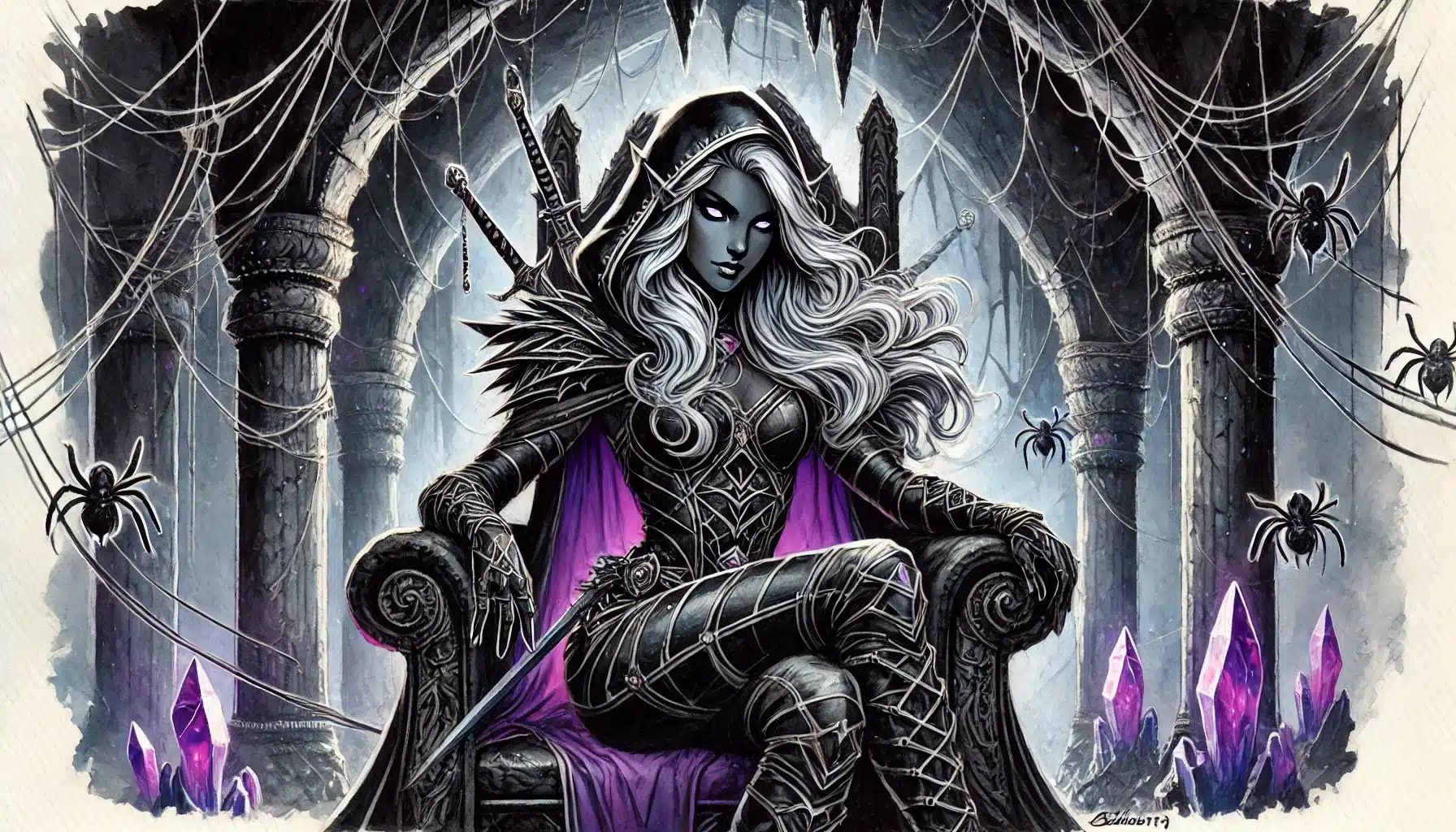To walk in a Drow’s boots—soft, soundless, spider-leather—means embracing contradictions. The Drow are creatures of shadow and sophistication, their legends knitted from strands of intrigue, ambition, and ancient pain. When you choose to play a Drow in Dungeons & Dragons 5.5e, you’re not just building another aloof elf; you’re stepping into a world where beauty cuts as sharply as betrayal, and kindness is a currency spent in secret.
There’s a dark elegance that clings to the Drow like a shroud, reflected in their graceful movements and the midnight silk of their hair. Their lives are shaped by the subtle flicker of candlelit plots, the calculated smile of a potential friend—or rival—and the constant hum of magical power at their fingertips. Spellcraft is woven into their daily rituals as tightly as the webs that drape their Underdark cities, each spell a tool of both survival and seduction. (And check out our Drow backstory generator if you want!)
Drow society is notorious for its political games. It’s a realm where no alliance is fixed, and every truth is fractal. To play a Drow is to dance along the edge of trust, spinning webs of half-truths that can catch an unwary DM just as surely as an unsuspecting goblin. Underneath it all lies a deep hunger for influence, driving Drow characters to seize power through charm, cunning, or coercion, rather than brute force. Roleplaying a Drow offers a playground not just for deception, but for rich interpersonal drama.
Yet, choosing to dwell in the twilight doesn’t mean settling for a stereotype. Drow aren’t just “edgy elves” with a penchant for melodrama. Their culture bristles with nuance—rituals of reverence, intense family rivalries, and a code of honor as twisted as it is ancient. The best Drow characters harness this complexity, tackling moral ambiguity head-on and seeking not just to “fit in” with a heroic party, but to challenge and change the narrative from within.
Approaching a Drow PC with depth means grappling with internal and external conflict. How does one shed or reshape the scars of a brutal upbringing? How do centuries-old hatreds play out beside campfire camaraderie? This guide is designed for those ready to go beyond clichés, helping you coax the full depth from one of the game’s most iconic—and misunderstood—lineages.
Understanding Drow Lore and Culture
To understand your Drow character, you must first step into the lightless grandeur of their world. Drow society is built on secrets—a matriarchal hierarchy, with the formidable priestesses of Lolth perched at the top. Power is measured not only by arcane ability or martial prowess, but by one’s knack for intrigue and survival. From birth, every Drow child is schooled in the art of reading faces, weaving lies, and seizing fleeting advantages.
Try my AI Tabletop RPG generators...and an extensive library of content!
Devotion to Lolth, the Spider Queen, warps every facet of Drow civilization. The goddess demands both fear and reverence; her test is simple—only the cunning or ruthless survive. In this crucible, daughters may usurp mothers, siblings spy on one another, and alliances shift with the tides of fate. The Drow’s worship of spiders, public deceit rituals, and house-based rivalries reinforce a society where no one is ever fully safe, nor fully trusted.
Below the surface, in the lightless labyrinth of the Underdark, politics becomes a constant pressure. Competing cities vie for scant resources, while individual Drow weigh their own ambition against the will of their house. At every turn, personal advancement threatens communal stability, and the tension between self and society sharpens every decision.
Yet, Drow culture isn’t monolithic. There is music, art, and philosophy beneath the cruelty—a love of poetics as sharp as their blades, celebrations that mask violence with beauty. Even within the darkest house, a glimmer of unorthodox kindness or unconventional honor may persist. Understanding these contradictions is key to building a Drow character who feels alive, not just notorious.
Unique Drow Cultural Traits & Customs
- Reverence for spiders (seen as Lolth’s sacred children)
- Intricate face-painting for status and deception
- Matriarchal lineages with hereditary priesthoods
- Loyalty enforced through magical geasa or pacts
- Public rituals of betrayal and “controlled” humiliation
- House sigils enchanted to reveal hidden loyalties
- Complex codes of etiquette in public and private gatherings
- Formal duels resolved by poison or spell, not blade
- Children raised by communal “creches” to encourage competition
- Magical tattoos to mark rank, pacts, or past betrayals
- Shadow festivals celebrating the beauty of darkness
- Debates held in double-layered meaning; sincerity is gauche
- Favor-based loyalty—allegiances shift with gifts or secrets
- Forbidden love stories passed as subversive legends
- Mourning rites that involve symbolic web-weaving
- Song duels where rivals trade threats disguised as poems
- Annual “Night of Masks” for anonymous plots and confessions
- Secret networks of informants in every household
Drow lore isn’t a cage—it’s a springboard. Details from their culture give you tools for deeper roleplay: a private ritual to mark a new alliance, a family secret that shapes decisions, a quiet longing for a different life. Use these foundations to ground your character, but don’t let tradition stifle creativity.
⚔️ Fantasy RPG Random Tables Books
Make life as a Gamemaster easier…
If you play Dungeons & Dragons, Pathfinder, or other fantasy RPGs, this
RPG random tables series
is packed with encounters, NPCs, treasure, and more. Available in eBook or print—either way, you’ll have a wealth of adventure ideas at your fingertips.
Remember, the best Drow characters are those who carry their heritage proudly, even as they break its rules. Let tradition inform, not restrict. Whether you play the steadfast devotee of Lolth, the cunning reformer, or the exile seeking redemption, it’s your interpretation that turns Drow lore from background story into living, breathing drama.
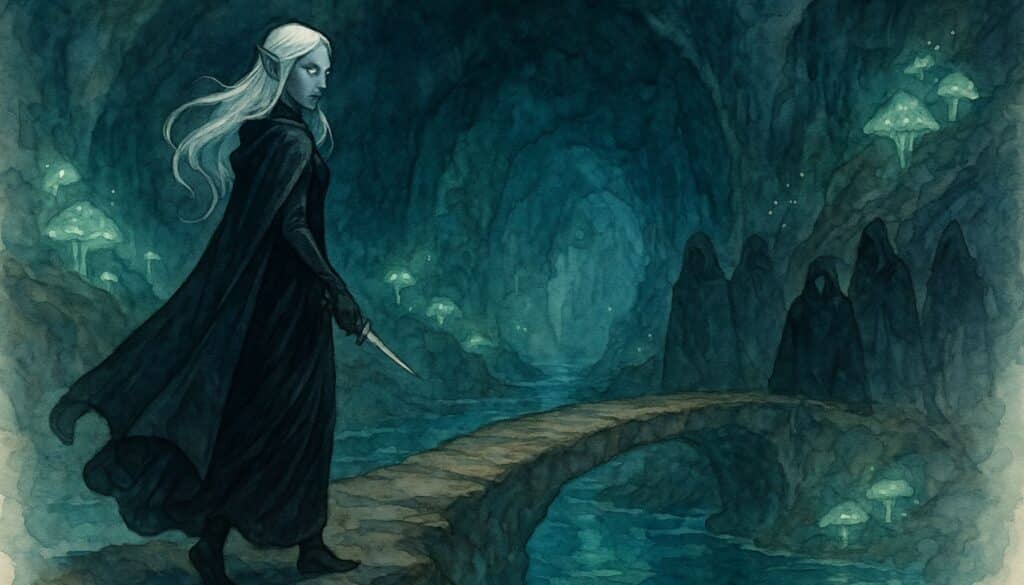
Building Your Drow Character
Drow offer a distinctive toolkit in 5.5e, fusing innate magic with natural stealth and social mastery. Theirs is a lineage forged for survival in darkness, reflected mechanically through traits like Superior Darkvision—an ability so potent it allows many Drow to skirt outright combat, slipping past enemies or catching them off guard.
Drow possess Fey Ancestry, granting resistance to charms and magical sleep. This complements their status as natural schemers—nearly impossible to deceive, and difficult to sway. The innate spellcasting, which includes Faerie Fire, Darkness, and Dancing Lights, gives every Drow an edge in manipulating environments and controlling the flow of encounters.
When choosing a class, some paths shine brightest. Rogues and Bards blend perfectly with the Drow’s natural affinity for stealth, deception, and quick thinking. Warlocks and Sorcerers play into the Drow’s flair for innate magic, with options for subtle sabotage or persuasive enchantment. But don’t be afraid to color outside these lines. The underappreciated Drow Paladin or Drow Monk can surprise a table, provided you create a story that gives their abilities a reason to shine.
Below is a selection of recommended pairings. Each leverages distinct features of the Drow toolkit, but remember—experimentation breeds memorable heroes.
| Suggested Class | Subclass Pairing | Role Type | Drow Feature Synergy |
|---|---|---|---|
| Rogue | Arcane Trickster | Stealth/Control | Innate magic, darkvision, expertise |
| Rogue | Assassin | Stealth/Alpha Strike | Surprise, darkness, poison |
| Sorcerer | Shadow Magic | Control/Utility | Darkness manipulation, charisma |
| Warlock | The Archfey | Debuff/Deceit | Fey ancestry, enchantment spells |
| Warlock | Great Old One | Psionics/Subterfuge | Psychic secrets, mental influence |
| Bard | College of Whispers | Social/Support | Deceit, spellcasting, inspiration |
| Bard | College of Glamour | Charm/Control | Charisma, enchantments, charm |
| Cleric | Trickery Domain | Support/Trickster | Illusions, duplicity, shadow magic |
| Ranger | Gloom Stalker | Skirmish/Scout | Darkvision, ambush, Underdark lore |
| Monk | Way of Shadow | Stealth/Mobility | Darkness spells, silence casting |
| Fighter | Eldritch Knight | Frontline Magic | Defensive magic, blade skills |
| Paladin | Oath of Vengeance | Pursuit/Striker | Retributive justice, social conflict |
Drow mechanics beg to be explored outside of narrow “sneaky mage” tropes. If you’re drawn to inventiveness, lean into Drow resilience by building a stalwart Drow Barbarian, a light-shunning Artificer, or a paladin whose faith sears into shadows.
Let story dictate mechanics, not the reverse. Sometimes the most fascinating Drow characters are those who buck expectation—not only subverting party suspicion, but overturning Drow stereotypes within the world itself.
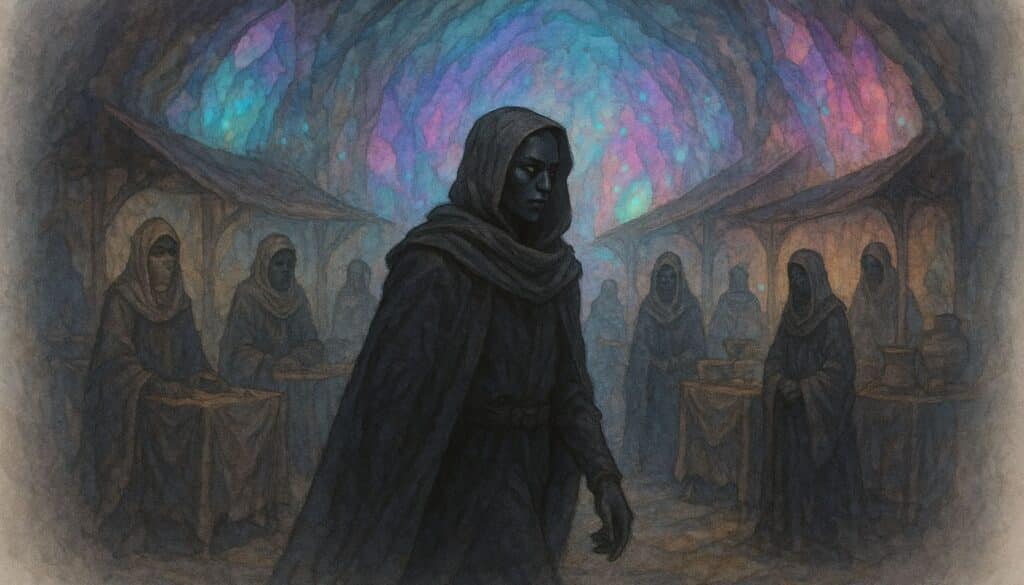
Subterfuge as a Playstyle
No one understands the power of smoke and mirrors quite like a Drow. Subterfuge is more than quick lies or pocket tricks—it’s a way of seeing the world. Drow specialize in soft words that slip past defenses, in secrets whispered during a dance, in plans so convoluted they seem like coincidence. Far from being a blunt manipulator, a Drow character is a master of nuance, preferring to shift outcomes without anyone realizing how much the table has tilted.
Roleplaying this style means focusing less on direct confrontation and more on orchestrating outcomes. A Drow character likely steers arguments with a well-timed compliment, seeds doubt with sly observation, or sabotages enemies while appearing utterly innocent. Yet true subterfuge isn’t just personal gain. It can be a tool for revealing truths, protecting allies, or unraveling enemies too powerful to face head-on.
Subtlety, after all, is sustainable. Overplaying your hand—making every interaction a manipulation—can come off as cliché or alienate your party. A well-played Drow knows when to keep secrets, when to reveal them, and when to let others think they know more than they do.
Consider subterfuge as a means to bring dimension to the game. Not every plot needs to be Machiavellian. Sometimes, something as simple as redirecting suspicion, using small details to your advantage, or playing two sides for the party’s benefit can turn an ordinary session into unforgettable drama.
Tactics for Subterfuge-Heavy Play
- Planting false rumors among NPCs to sway local politics
- Disguising intent behind flattery or doubletalk
- Setting multi-step traps (physical, social, or magical)
- Redirecting blame during group interrogations
- Coaxing sensitive information from targets under false pretenses
- Arranging “accidents” for enemies with plausible deniability
- Using the Darkness spell to mask escapes or thefts
- Eavesdropping through magical means (invisible familiar, Message)
- Blackmailing NPCs with secrets gleaned over time
- Disrupting enemy plans by sabotaging supplies or alliances
- Exploiting party rumors or gossip for leverage
- Playing allies and rivals against each other subtly
- Leveraging surface naiveté to feign helplessness or ignorance
- Disposing of evidence to avoid party suspicion
- Delaying or misrouting messages for strategic misunderstanding
Subterfuge isn’t just a solo act—it adds delicious friction within the party. Drow intrigue gives your group new angles for trust, betrayal, and reconciliation, but it’s a balance. Make sure the group’s goals align often enough that secrets remain spice, not poison.
⚔️ Fantasy RPG Random Tables Books
Make life as a Gamemaster easier…
If you play Dungeons & Dragons, Pathfinder, or other fantasy RPGs, this
RPG random tables series
is packed with encounters, NPCs, treasure, and more. Available in eBook or print—either way, you’ll have a wealth of adventure ideas at your fingertips.
Complexity is the key. The tension between sharing and hiding, acting for self or for team, makes subterfuge-heavy Drow characters unforgettable. Give others a reason to keep digging, and you’ll find your party not only watching your Drow more closely, but inviting you to deepen the story together.
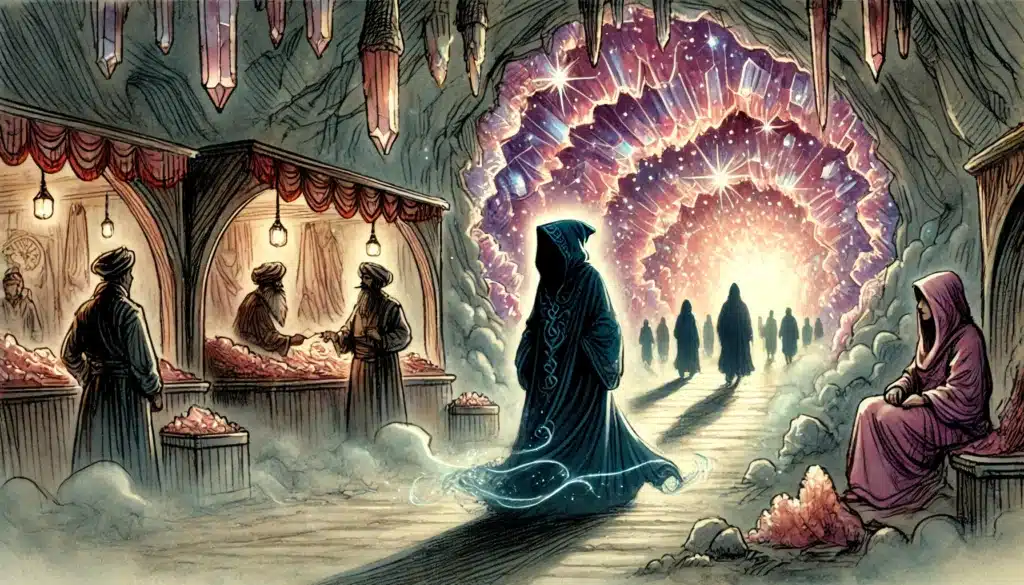
Drow in a Mixed Party
The shadow of the Underdark falls long, and most surface-dwellers carry tales of Drow treachery like warding charms. Integrating a Drow into a party of surfacers means facing suspicion, friction, and the delicate balance between roleplaying conflict and real fun at the table. Begin by acknowledging this head-on: discuss with your group and DM both the narrative risks and the rewards.
Distrust needn’t devolve into “murder hobo” paranoia. Use cultural clashes and mutual misconceptions as grist for the storytelling mill. A Drow might struggle with open-hearted trust or be disgusted by surface customs, but shared adversity can breed unlikely loyalty. Frame your character’s place in the party not as infiltration, but as transformation—someone both shaped by and shaping the group.
Backstory is your secret weapon. Why has your Drow left the security (or chains) of the Underdark? Whether exile, rebellion, redemption, or a quest for knowledge, these motivations offer natural hooks for cooperation. Make it clear why your character’s goals align with the party, even if their methods or morals occasionally clash.
When playing a character with a reputation for secrecy, check in regularly with your group. Out-of-character communication is as important as in-character drama. Make sure everyone’s enjoying the mystery, not feeling excluded by it.
Narrative Hooks for Joining a Party
- Escaping a Lolth-worshipping cult or failed coup
- Sent undercover by a Drow house to study surfacers
- Seeking redemption after betraying a sibling or mentor
- Hunting a lost relative who defected to the surface
- Enchanted to forget Drow memories—now seeking the truth
- Tasked to spy for a surface faction as double-agent
- Forced into exile after breaking a taboo (e.g., mercy)
- Fleeing from a vengeful matron-mother’s wrath
- Compelled by a prophecy only the surface can reveal
- Working alongside surfacers to collect rare magical lore
- On a personal quest to craft or reclaim an artifact
- Hired as a mercenary guide through dangerous lands
- Bound by a surface oath or boon to aid the party
- Escaping Underdark slavery with the party’s help
Group communication and consent are essential when playing a secretive or morally grey character. Make sure every player gets a chance to shine, not just you and your secrets. There’s more drama in resolving tensions, forgiving betrayals, or growing past old hatreds than in “winning” at deception.
Let your Drow be a catalyst for new party dynamics—but always in a way that builds the story together.
Roleplaying Depth and Growth
A Drow character who never changes is a missed opportunity. The most compelling Drow stories unfold through growth—a slow, thorny journey from suspicion to trust, cruelty to compassion, or despair to hope. Delve into the internal contradictions: pride in your people’s achievements, guilt for their cruelties, longing for acceptance from a world that mistrusts you.
Let the world test your beliefs. Encounters with mercy, injustice, or forgiveness can bend your Drow’s worldview in surprising ways. Do you cling to old lessons—strike first, trust no one—or do you risk vulnerability for the sake of new bonds? Challenge your character’s assumptions; give them moments to reflect, regret, or revel in changes.
Explore cultural dissonance. Watching surfacers mourn their dead, offer unguarded praise, or display selfless heroism may incite envy, disbelief, or grudging admiration. Perhaps your Drow secretly records these moments in a code only they understand, marking the slow weathering of their Underdark shell.
Growth doesn’t mean abandoning roots. Even as your Drow adapts, old scars may flare up. The dichotomy between who they were trained to be and who they choose to become creates enduring drama—sometimes with setbacks, sometimes with glorious victories.
Character Growth Prompts
- Forced to save a lifelong rival during battle
- Tempted to betray the party but choosing loyalty
- Facing open prejudice from townsfolk and reconsidering views on outsiders
- Questioning faith after witnessing Lolth’s cruelty (or mercy)
- Befriending a surface-born enemy from childhood tales
- Secretly grieving for a lost Drow family member while hiding it from the party
- Struggling to forgive themselves for old sins
- Forming a forbidden romantic attachment
- Confronting another Drow whose beliefs have not changed
- Rejecting a cruel order from a figure of Underdark authority
- Trusting a party member with a significant secret
- Adopting a surface custom (food, ritual, fashion)
- Weighing the value of mercy versus vengeance in a crisis
- Defending the party against Drow pursuers, risking personal harm
- Sacrificing personal ambition for the party’s good
- Writing letters home that are never sent
- Wondering if old foes might become new friends
These prompts don’t just deepen your Drow—they enrich the entire story. A party that helps, heals, or challenges a conflicted Drow will remember those moments far longer than any simple dungeon crawl.
Growth arcs make Drow narratives not just impressive, but deeply personal. Your Drow is more than a pawn of the shadows; they can become the pulse of the party’s evolving story.
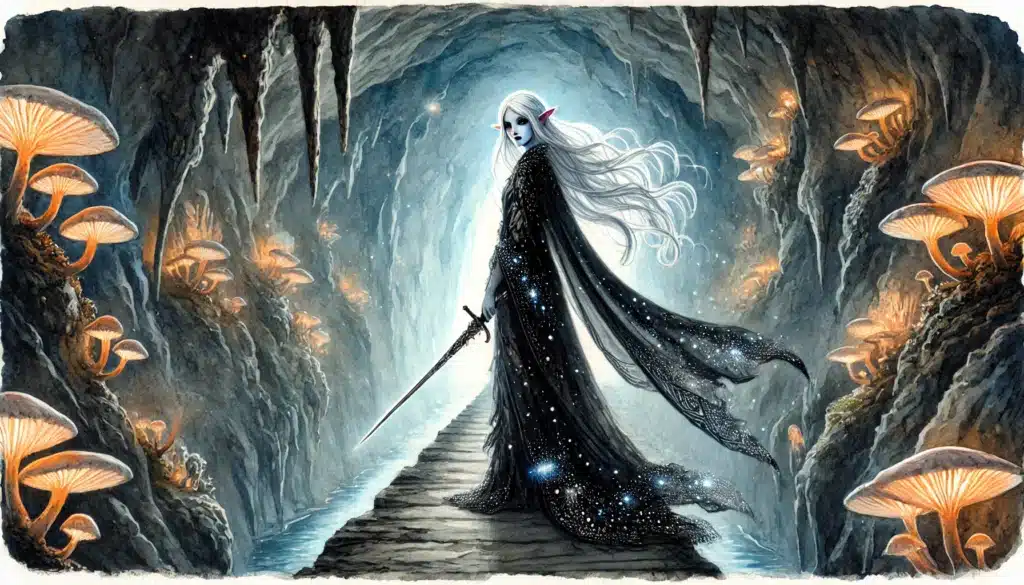
Common Mistakes and Stereotypes
There’s a temptation, with Drow, to descend into the one-dimensional. Brooding loners who only ever skulk, sneer, or backstab become exhausting—for both storyteller and party. Avoid falling into the trap of “always evil” or “irredeemably cruel.” These tropes flatten the Drow’s cultural richness and rob you of more interesting opportunities.
Try my AI Tabletop RPG generators...and an extensive library of content!
Some players try to justify disruptive behavior with “it’s what my character would do,” weaponizing stereotype as license to undermine fun. Pure nihilism, constant sabotage, and relentless antagonism do little but stall play. There’s a line between darkness and destructiveness—a good Drow character toes it, making the shadows flicker without snuffing out the story’s light.
Remember, the Drow’s power is in nuance. Intrigue, drama, and secrets are most effective when balanced with genuine connections, hope, or moral questioning.
Avoiding Edgelord Syndrome
Let’s banish the “edgelord” from Drow tables. Complexity is the goal, not a parade of grimdark clichés. Instead of making your Drow a vortex of misery and mistrust, focus on emotional range. Give them moments of humor, vulnerability, even joy. Let friendship and hope become cracks through which the light peeks, gilding the shadows.
Sharing the spotlight is key. If your secrets or trauma swallow every scene, your group will lose interest fast. Build dynamics where your Drow’s intensity draws others in, rather than dominating every interaction.
Tone makes the difference. A Drow who can laugh, love, and even fail spectacularly is more fun to play and play with than one forever mired in doom.
Red Flags and Clichés to Avoid
- Speaking exclusively in cryptic or melodramatic whispers
- Refusing to cooperate with any plan not your own
- Obsessing over killing, vengeance, or darkness
- Undermining party goals for personal gain—always
- Never showing vulnerability or humor
- Treating every NPC with automatic contempt
- Sabotaging the party “for the challenge”
- Claiming surface customs are always inferior
- Never sharing backstory or motivation with the group
- Refusing to heal, aid, or protect teammates
- Turning every social scene into a power struggle
- Constantly alluding to mysterious, unearned trauma
- “I’m just evil, that’s why I do it”—with no nuance or growth
Flip these patterns on their head. Let your Drow surprise the party (and yourself) by showing kindness—or at least by failing spectacularly to hide their soft side.
Edgy doesn’t have to mean exhausting. Intrigue can be playful, personal, even poignant—the true joy is in subverting expectations, not meeting them.
Staying True Without Being Toxic
Drow characters thrive on tension, but that energy should never curdle into toxicity. Strategic friction can drive story, if you use it as fuel for drama rather than to wedge the party apart. Even morally grey behavior is best when it enriches play instead of breaking it.
Channel the “darkness” into actions that challenge, grow, or change the status quo—within the story’s boundaries, not outside them.
Morally Grey Behaviors That Enrich Play
- Negotiating or bargaining with an enemy instead of fighting
- Hiding a brutal past while striving to do better now
- Using intimidation or fear to maintain peace in a tense city
- Making clever compromises rather than resorting to violence
- Withholding information to prevent panic—but revealing it when needed
- Threatening without actually following through, as a bluff
- Sparing a “deserving” foe for strategic gain
- Sparring verbally with party members to test their resolve, not break them
- Sacrificing reputation for a greater hidden good
- Taking calculated risks with plausible deniability
- Secretly protecting the party, even if pretending otherwise
The Drow are wired for drama—use it. Let secrets create tension that resolves satisfyingly, rather than dangling endlessly. Give the group reasons to trust, forgive, or challenge your character, not just resent.
Good Drow play is the art of keeping tension alive while protecting group trust. Let the shadows stretch—but never let them swallow the whole stage.
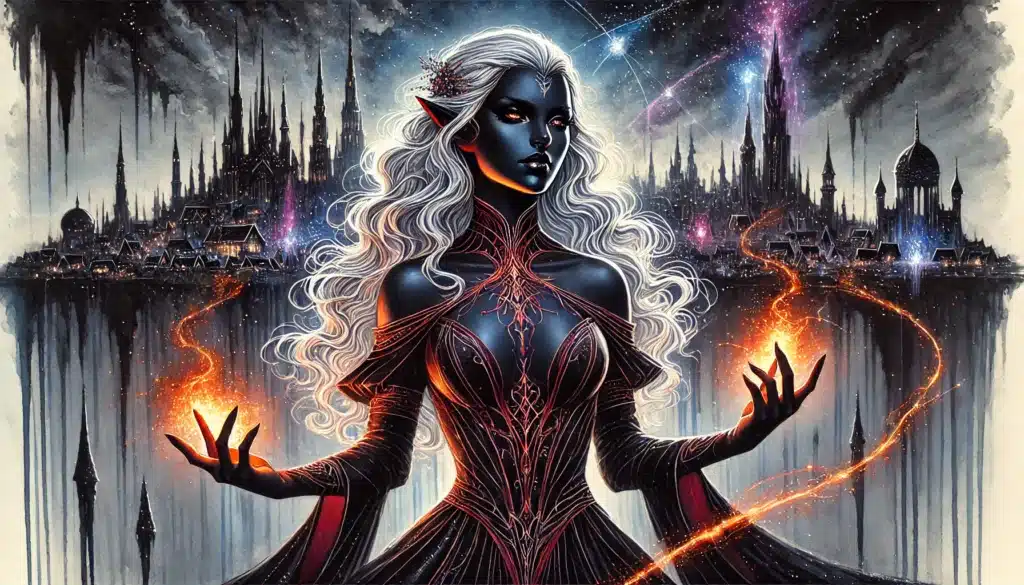
Final Thoughts on Playing a Drow
Playing a Drow in D&D 5.5e is never about settling for “the dark one” slot. It’s about inhabiting a world rich in contradiction and culture, where every decision ripples with consequence. Drow bring a legacy steeped in elegant violence and subtle artistry—a foundation that rewards players who hunger for more than simple heroics.
Mechanically, Drow are versatile, powerful, and flavorful. Their blend of innate magic, sensory mastery, and resilience provides fertile ground for every class and party role. Still, the mechanics only sing when married to story. The true impact of a Drow character comes from weaving their cultural struggles and personal ambitions into the party’s evolving narrative.
⚔️ Fantasy RPG Random Tables Books
Make life as a Gamemaster easier…
If you play Dungeons & Dragons, Pathfinder, or other fantasy RPGs, this
RPG random tables series
is packed with encounters, NPCs, treasure, and more. Available in eBook or print—either way, you’ll have a wealth of adventure ideas at your fingertips.
The most memorable Drow are those who grow. Let them wrestle with prejudice, with longing, with wounds both deep and fresh. Let them dabble in cruelty, then stumble into grace. Let the journey from shadow to sunlight transform not just your character, but the party that travels with them.
For Dungeon Masters, support this narrative depth. Give the Drow opportunities to face their past, challenge tradition, and taste hard-won acceptance. Fill the world with echoes of the Underdark—old rivals, chances for redemption, and intrigue at every turn.
In the end, playing a Drow is an exercise in creative subterfuge. You’re not just spinning deceit—you’re spinning gold from shadow, finding new shades in what everyone thought was just black and white. Tell your story boldly, twine light and darkness together, and give your table a Drow whose secrets are worth discovering.

